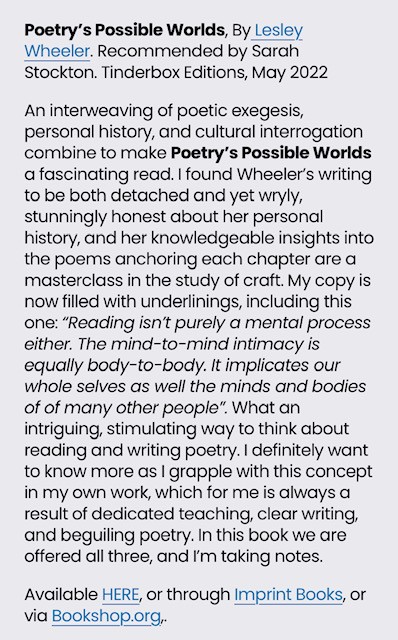
Pumpkins are all right (in pies, not in lattes, thanks)–but what the suddenly cool, rainy weather makes me want to do is read. It’s also nourishing to be read. Hurrah for the thoughtful attention Sarah Stockton gives Poetry’s Possible Worlds in the Staff Favorites section of River Mouth Review. I love the Octoberish timing AND that it coincides with the second printing appearing at the distributor. This means you can order it again directly through SPD or your favorite indie bookstore. It’ll soon show up on other places you order books, too. A small press book tends to spider along–think of silk threads thrown out, wafting in a breeze, and finally sticking somewhere. It’s both a stroke of luck when it does, and a result of arachnid effort and patience. The first push on this Poetry’s Possible Worlds is done, I think, but I’ll keep spinning.
The small press book I’m reading right now is Allison Adelle Hedge Coke’s Look at This Blue. I hadn’t realized before I picked it up that it’s a long poem–she calls it an “assemblage”–although the thinking she does about epidemic violence, ecological damage, and inequity is a through-line in all her work. I need and want to read it slowly and not when I’m tired in the evening, which has been my time for page-turning fiction.
For the late-night spot, I was on a Stephen King binge (I need to write about why sometime), but my son gave me The Golden Enclaves for my birthday, so I’m deep into that one, the third entry in Naomi Novik’s Scholomance trilogy. I’m reading toward a course on schools of magic, both for the pleasure of it and because it’s grounds for thinking about education more generally. Magic is power, right? My undergraduates have the power of talent, and often the power of money and social privilege; it’s useful for them, and for me, to think about how a college’s culture and curriculum aims to channel that power, and to what extent a university can increase equity (the idealistic goal) or further undermine it (often the reality). Novik’s series is so much about how every institution, including the apparently meritocratic Scholomance, actually helps the wealthy conserve their resources at terrible social expense. I’m only 2/3 through, but I think the main character is basically reinventing communism, magic-style. It’s a sharp contrast to the disappointing ending of the Harry Potter franchise. Sure, let’s be nicer to the house elves and goblins because we’re good people–but no way are we actually going to empower them by letting them into Hogwarts! Harry and his friends hate discrimination against Mudbloods but ultimately reinstate an only slightly better version of the status quo, as most literary heroes do. (My spouse adds: “And of course Slytherin must continue, because fascists deserve their own house too”–fair and balanced.) We loved reading the Potter series to our kids, and I’ll never deny that it’s riveting and created a ton of readers when kids’ reading was on the wane, but its politics were noxious long before Rowling became a defender of anti-trans prejudice.
For my British and Irish poetry class, we just finished the Great War poets and are heading into the international modernists…who are deployers of ellipsis to an extent I’d never contemplated before. The Norton Anthology headnote says that T.S. Eliot was the first “important” user of ellipsis to indicate “panicky repressions,” and sure, there’s a ton of it in “The Love Song of J. Alfred Prufrock,” for instance. Eliot’s poetic speakers are always having something like panic attacks. In Sassoon’s “Repression of War Experience” the passages of lost time are due to shell-shock; the speaker tries and tries to redirect his thoughts, but trauma has etched a deep groove he keeps falling into. H.D. is bigger on the dash; I notice ellipses mainly when she quotes fragments of Sappho, where the elision has to do with sexuality as well as the loss of women’s voices to history. Steph Burt has already used the term “elliptical poetry” for contemporary verse, but modernism is a confusing name for the poetry of 100 years ago, so maybe we could rename it?
Hibernation is ellipsis, too. I was sorry to have two readings canceled by Hurricane Ian this weekend, but the unexpected time at home to rest and read was in other ways a gift.


One response to “Book season (hours of ellipsis)”
A lovely entry here. Any time, any reason I have for extra rest and reading is always welcome although I have to admit that a hurricane is off the charts.
LikeLike